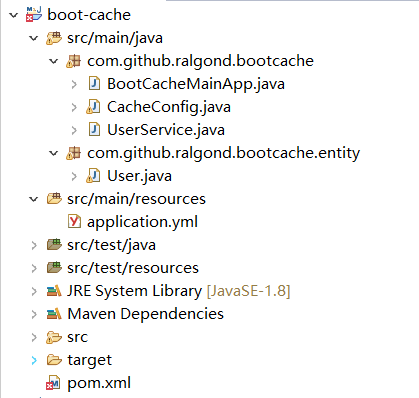1、建立新工程并编辑pom文件
<project xmlns="http://maven.apache.org/POM/4.0.0"
xmlns:xsi="http://www.w3.org/2001/XMLSchema-instance"
xsi:schemaLocation="http://maven.apache.org/POM/4.0.0 http://maven.apache.org/xsd/maven-4.0.0.xsd">
<modelVersion>4.0.0</modelVersion>
<groupId>com.github.ralgond</groupId>
<artifactId>boot-redis</artifactId>
<version>0.0.1-SNAPSHOT</version>
<parent>
<groupId>org.springframework.boot</groupId>
<artifactId>spring-boot-starter-parent</artifactId>
<version>2.3.0.RELEASE</version>
</parent>
<properties>
<start-class>com.github.ralgond.bootcache.BootCacheMainApp</start-class>
</properties>
<dependencies>
<dependency>
<groupId>org.springframework.boot</groupId>
<artifactId>spring-boot-starter-web</artifactId>
</dependency>
<dependency>
<groupId>org.springframework.boot</groupId>
<artifactId>spring-boot-starter-cache</artifactId>
</dependency>
<dependency>
<groupId>org.springframework.boot</groupId>
<artifactId>spring-boot-starter-data-redis</artifactId>
</dependency>
<dependency>
<groupId>org.springframework.boot</groupId>
<artifactId>spring-boot-starter-json</artifactId>
</dependency>
</dependencies>
<build>
<plugins>
<plugin>
<groupId>org.apache.maven.plugins</groupId>
<artifactId>maven-compiler-plugin</artifactId>
<version>3.0</version>
<configuration>
<source>1.8</source>
<target>1.8</target>
</configuration>
</plugin>
<plugin>
<groupId>org.springframework.boot</groupId>
<artifactId>spring-boot-maven-plugin</artifactId>
</plugin>
</plugins>
</build>
</project>
2、工程结构

3、编辑application.yml
server:
port: 8888
spring:
redis:
database: 0
host: 127.0.0.1
port: 6379
4、编辑User类
package com.github.ralgond.bootcache.entity;
public class User {
private Integer id;
private String name;
public User() {
}
public User(Integer id, String name) {
this.id = id;
this.name = name;
}
public Integer getId() {
return id;
}
public void setId(Integer id) {
this.id = id;
}
public String getName() {
return name;
}
public void setName(String name) {
this.name = name;
}
@Override
public String toString() {
return "User [id=" + id + ", name=" + name + "]";
}
}
5、编辑UserService类
package com.github.ralgond.bootcache;
import java.util.HashMap;
import org.springframework.cache.annotation.CacheConfig;
import org.springframework.cache.annotation.CacheEvict;
import org.springframework.cache.annotation.CachePut;
import org.springframework.cache.annotation.Cacheable;
import org.springframework.stereotype.Service;
import com.github.ralgond.bootcache.entity.User;
@Service
@CacheConfig(cacheNames = "user")
public class UserService {
HashMap<Integer, User> userMap = new HashMap<>();
int maxUserId = 1;
@CachePut(key = "#u.id")
public synchronized User addUser(User u) {
u.setId(maxUserId++);
userMap.put(u.getId(), u);
return u;
}
@Cacheable(key = "#id", unless="#result == null")
public synchronized User getUser(int id) {
User user = userMap.get(id);
System.out.println("====>get from db: " + user);
return user;
}
@CacheEvict(key = "#id")
public synchronized void deleteUser(int id) {
userMap.remove(id);
}
}
6、编辑CacheConfig类
package com.github.ralgond.bootcache;
import java.time.Duration;
import java.util.HashMap;
import java.util.Map;
import org.springframework.cache.CacheManager;
import org.springframework.context.annotation.Bean;
import org.springframework.context.annotation.Configuration;
import org.springframework.data.redis.cache.RedisCacheConfiguration;
import org.springframework.data.redis.cache.RedisCacheManager;
import org.springframework.data.redis.cache.RedisCacheWriter;
import org.springframework.data.redis.connection.RedisConnectionFactory;
import org.springframework.data.redis.core.RedisTemplate;
import org.springframework.data.redis.serializer.GenericJackson2JsonRedisSerializer;
import org.springframework.data.redis.serializer.RedisSerializationContext;
import org.springframework.data.redis.serializer.StringRedisSerializer;
@Configuration
public class CacheConfig {
@Bean
public RedisTemplate<String, Object> redisTemplate(RedisConnectionFactory redisConnectionFactory) {
RedisTemplate<String, Object> redisTemplate = new RedisTemplate<String, Object>();
// 注入数据源
redisTemplate.setConnectionFactory(redisConnectionFactory);
// 使用GenericJackson2JsonRedisSerializer 替换默认序列化
GenericJackson2JsonRedisSerializer jackson2JsonRedisSerializer = new GenericJackson2JsonRedisSerializer();
StringRedisSerializer stringRedisSerializer = new StringRedisSerializer();
// key-value结构序列化数据结构
redisTemplate.setKeySerializer(stringRedisSerializer);
redisTemplate.setValueSerializer(jackson2JsonRedisSerializer);
// hash数据结构序列化方式,必须这样否则存hash 就是基于jdk序列化的
redisTemplate.setHashKeySerializer(stringRedisSerializer);
redisTemplate.setHashValueSerializer(jackson2JsonRedisSerializer);
// 启用默认序列化方式
redisTemplate.setEnableDefaultSerializer(true);
redisTemplate.setDefaultSerializer(jackson2JsonRedisSerializer);
/// redisTemplate.afterPropertiesSet();
return redisTemplate;
}
@Bean
public CacheManager cacheMananger(RedisTemplate redisTemplate) {
RedisCacheConfiguration userCacheConf = RedisCacheConfiguration.defaultCacheConfig()
.entryTtl(Duration.ofSeconds(30))
.disableCachingNullValues()
.serializeValuesWith(
RedisSerializationContext.SerializationPair.fromSerializer(redisTemplate.getValueSerializer()));
Map<String, RedisCacheConfiguration> redisCacheConfigurationMap = new HashMap<>();
redisCacheConfigurationMap.put("user", userCacheConf);
RedisCacheWriter redisCacheWriter = RedisCacheWriter.nonLockingRedisCacheWriter(redisTemplate.getConnectionFactory());
RedisCacheConfiguration defaultCacheConfig = RedisCacheConfiguration.defaultCacheConfig();
defaultCacheConfig.entryTtl(Duration.ofSeconds(20));
RedisCacheManager cacheManager = new RedisCacheManager(redisCacheWriter, defaultCacheConfig, redisCacheConfigurationMap);
return cacheManager;
}
}
7、编辑主启动类
package com.github.ralgond.bootcache;
import org.springframework.beans.factory.annotation.Autowired;
import org.springframework.boot.SpringApplication;
import org.springframework.boot.autoconfigure.SpringBootApplication;
import org.springframework.cache.annotation.EnableCaching;
import org.springframework.web.bind.annotation.PathVariable;
import org.springframework.web.bind.annotation.RequestMapping;
import org.springframework.web.bind.annotation.RequestMethod;
import org.springframework.web.bind.annotation.RestController;
import com.github.ralgond.bootcache.entity.User;
@SpringBootApplication
@RestController
@EnableCaching
public class BootCacheMainApp {
@Autowired
UserService userService;
@RequestMapping(method=RequestMethod.POST, value="/user/add/{name}")
public User addUser(@PathVariable("name") String name) {
User user = new User(-1, name);
return userService.addUser(user);
}
@RequestMapping(method=RequestMethod.POST, value="/user/del/{id}")
public void delUser(@PathVariable("id") int id) {
userService.deleteUser(id);
}
@RequestMapping(method=RequestMethod.GET, value="/user/{id}")
public User getUser(@PathVariable("id") int id) {
User user = userService.getUser(id);
return user;
}
public static void main(String args[]) {
SpringApplication.run(BootCacheMainApp.class, args);
}
}



